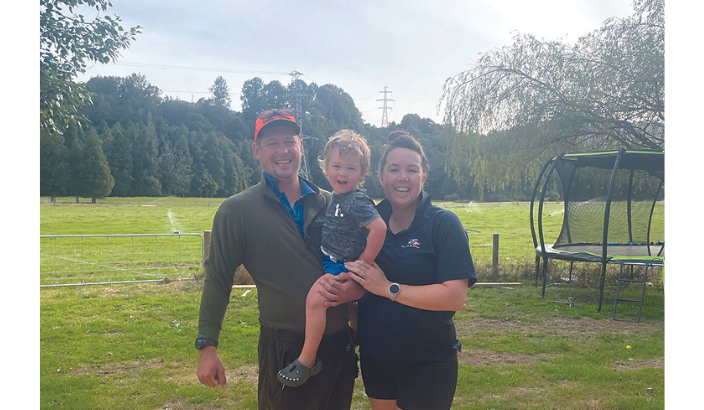No staff shortage at Fern Farm Flat


Brendan and Ali Lochhead of Fern Flat Farm with their two-year-old son Fergus. Photo: Supplied.
ELOISE MARTYN
Fern Flat Farm is a 260 hectare dairy farm, home to around 600 cows and located 16km from the Murchison township.
Brendan and Ali Lochhead, who are 50:50 sharemilkers on Fern Flat, moved to the farm in June 2021 from Eketāhuna, in the Manawatu region, where they had started off contract milking and then leased a 250-cow farm where they continued contracted milked for a for several years.
Affordable land prices in Murchison, family nearby and more land for their additional heifers they had raised drove the move.
While farming in Eketāhuna the Lochhead’s had been challenged with finding and retaining staff.
“We also didn’t have any decent housing on the farm which added to our staffing problems” Brendan adds.
With long hours and limited days off the couple decided they needed to change they way they farmed to increase their income so they could not only employ someone to provide flexibility around time off but free up some time to look at how they could expand.
This part was easier than finding reliable, willing workers.
“Eketāhuna has relatively safe summers weather wise and is really wet in early spring, so we moved our calving to September and dried off on the 15th of July,” explains Brendan.
This enabled them to produce more milk during the winter milk premium period.
This move generated an additional 60-70K income per season which enabled them to buy a baler and look seriously at employing someone.
“We didn’t just want a break, we wanted to use that money to employ someone to free me up so I could utilise the extra time to grow our business. Even with the money, we still couldn’t find any staff” Sates Brendan.
After trying multiple times to find staff the Lochhead’s tried a company called HelpX which is a cultural exchange for working holiday makers looking for the opportunity during their travels abroad, to stay with local people and gain practical experience.
The helper works an average of 3-4 hours per day in exchange for accommodation and food.
“It was great,” beams Ali. “They were willing to help and keen to learn, they loved the farm experience. The downside was that they left”.
Further investigating for staff introduced them to the idea of migrant workers from the Philippines. So, they decided to try it.
“Our decision to try it didn’t go down well with family and friends,” says Brendan.
“However, the fact remained we could not find staff. We needed to do something.”
Felipe was their first migrant worker from the Philippines, who came to the farm with two years milk harvesting experience gained in Japan.
Felipe is now in his fourth season with the Lochhead’s and is their 2IC.
“It really worked out for us, but we also really tried to make Felipe welcome and part of our lives,” says Ali.
With the success of Felipe, the Lochhead’s continued with migrant labour and now have three full time workers on their farm as well as Brendan.
“People might say we are over staffed, but we are here for the long haul. We don’t want our staff working day and night and getting burnt out,” Ali explains.
The couple also have some changes coming up that are only possible because of the workers.
“Come May, we will be a fully self-contained unit, which wouldn’t be doable without the third worker,” Brendan says.
“We are also increasing our herd by 50 cows and we will be putting one of our herds onto once-a-day milking’s to really look after our young cows.”
With labour shortages an industry-wide problem, migrant workers could be a solution for others depending on the location of your farm.
“The Filipinos are really social people. They love community and don’t enjoy isolated areas at all,” Ali says.
In fact, one of the upsides of employing two other Filipino workers has been company for Felipe, their first migrant worker.
“There are ten Filipino workers in the area now. Three here, one - a nurse, at the Murchison hospital, a few at a local honey farm and few others here and there on other dairy farms,” says Ali.
“They get together a lot and really enjoy each other’s company which is neat.”
“These guys are not only helping us,” Brendan says. “We are also helping them, and I don’t think a lot of people really realise what it’s like where they have come from.”
The three workers use their wages to support family back in the Philippines who are in poverty with no job opportunities, no welfare system and health care problems.
“One of our workers has been able to send his kids to private school to give them a decent education to ensure they will have a job in the future.”
As well as purchase rice patties and fish farms that provide on going income to their families.
“All these opportunities would not be possible with out paid work here in New Zealand,” says Brendan.
“It’s a hard one really, we would love to employ kiwis, but they just don’t apply for the jobs.
"These guys are great, we wouldn’t be able to farm without them. They are also open to improvement and have also helped us be better people ourselves.
"I would say the whole experience has been about letting people help each other and we are really enjoying it.”
